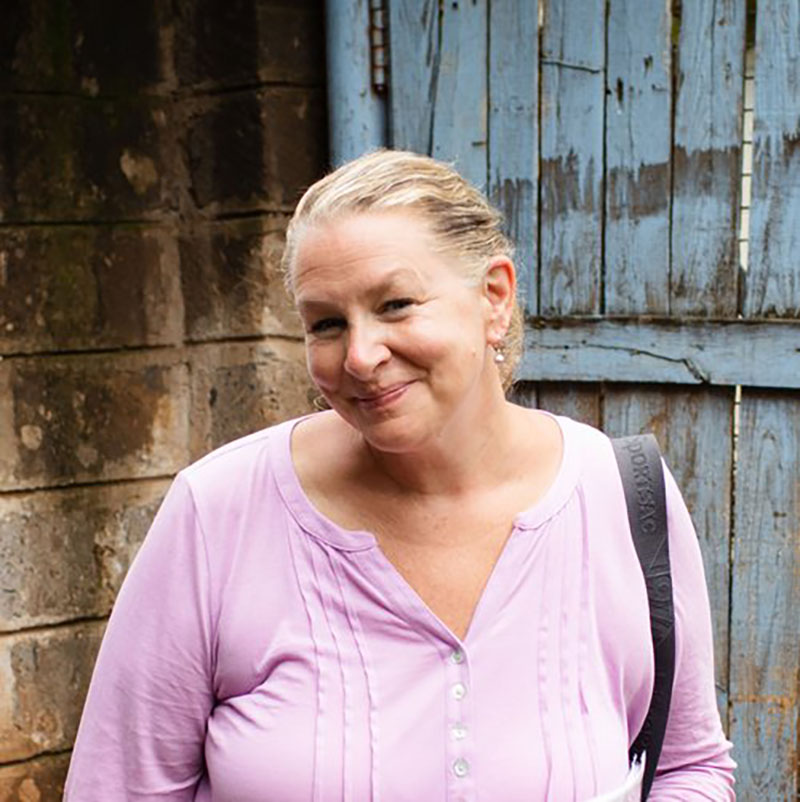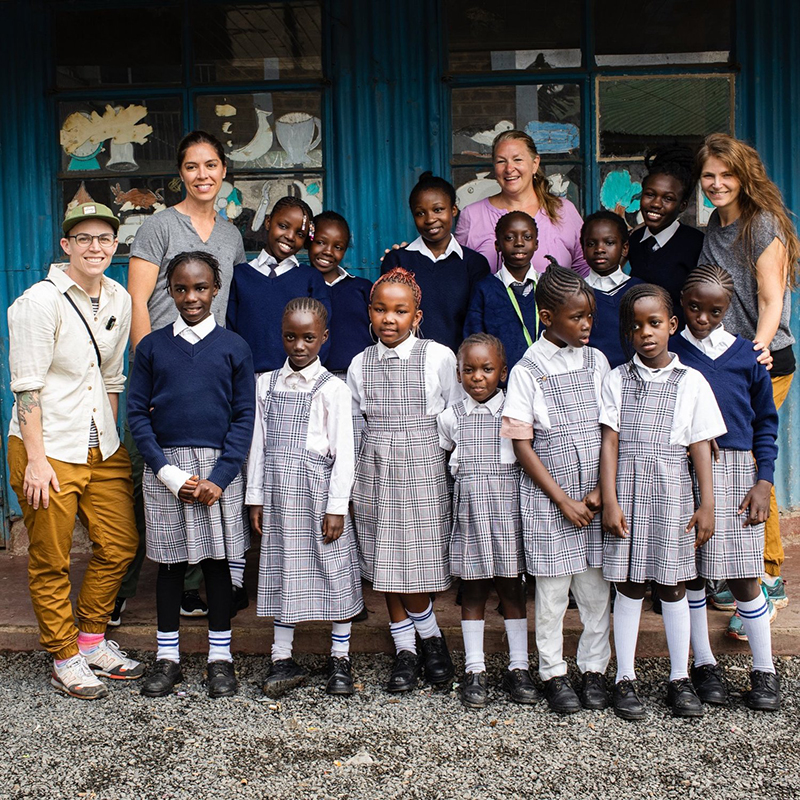Get Involved
Your knowledge, experience and expertise can help students thrive. From supporting them as they decide to come to SCSU to mentoring them as they navigate their next career step.
One fateful trip to Kenya changed Lynn Younglove’s life forever, but it also changed the lives of nearly 50 girls living in one of the world’s largest slums.
Well, nearly 50 girls so far.
The St. Cloud State University alumna first visited the Kibera slum near Nairobi, Kenya with her sister-in-law Connie Nielsen. Nielsen, an actress, had first visited the area while on location for a film, and vowed to return with resources after some of the local scouts, extras and other talent asked her to bring water on her next visit. She ended up putting together the Human Needs Project organization, which would launch the Kibera Town Centre — a center complete with a well, coffeehouse, computer, skills training, laundry facility, toilets and showers. Younglove visited the area with Nielsen for the launch of the center, and walked through the slum during her visit. On her walk she met a woman named Judy, who invited her into her home.
“She was talking to me about her children and I was asking her questions, and she said she had seven children,” Younglove said. “And I of course was like, ‘Seven children? I can barely handle the two I have.’ And she said, very matter-of-factly, ‘Yep, I get raped a lot, but I love them all the same.’”
Younglove said the conversation was like a “punch to the gut,” especially with how Judy seemed so happy and unaffected, despite the fact that she and her children remained at home all day every day with little to no resources.
“As I was leaving her, I just started to cry and I thought, ‘I’m leaving and she’s staying. She’s staying here forever with seven children and I leave,’” she said. “I just couldn’t get that out of my head.”
She then approached Nielsen later that night and told her about the experience meeting Judy. Younglove started to cry, telling Nielsen she knew they couldn’t save everyone, but felt she had to do something.
“Connie just said, ‘Snap out of it. Go home and raise money to send Judy’s seven kids to school. Then you’re helping the mom, and you’re helping the kids,’” Younglove said. “And I was like, ‘Okay.’”
 From there Younglove developed Road to Freedom Scholarships, an organization that works to break the “cycle of poverty by providing educational opportunities to the girls of Kibera.” She fundraised from her friends and colleagues and was able to send 22 children total — including Judy’s seven children — to school, and kept fundraising so they were able to complete all of their schooling. One scholarship provides more than just tuition; it provides school fees, a uniform, shoes, hygiene products, basic medical care, clean water, one meal per day, transportation and school supplies.
From there Younglove developed Road to Freedom Scholarships, an organization that works to break the “cycle of poverty by providing educational opportunities to the girls of Kibera.” She fundraised from her friends and colleagues and was able to send 22 children total — including Judy’s seven children — to school, and kept fundraising so they were able to complete all of their schooling. One scholarship provides more than just tuition; it provides school fees, a uniform, shoes, hygiene products, basic medical care, clean water, one meal per day, transportation and school supplies.
“Once I get them in school, I’m not taking them out,” Younglove said.
She said only 8 percent of the girls in Kibera have a chance to go to school due to their parents’ limited resources; the average adult in Kibera earns just $1 a day. The area has no infrastructure, and there is no free public schooling. Many children are often pulled out of school or attend off and on due to their parents — many of whom are single mothers — not being able to afford tuition or other school fees.
“It’s hard to learn in that environment anyway — without clean water or food — and then when you’re taken out of school so often, it’s obviously harder to learn,” Younglove said. “It is hard — people have very hard lives there, but they’re all happy and smart and charming and beautiful and interesting, and they speak Swahili and speak English. I walked away from the slum feeling inspired because they were such happy, busy people in spite of not having clean water, or food or lights or electricity or garbage or mail or roads. And they’re all just busy helping each other. Of course Judy and her situation made me sad, and there are moments that are hard, because it is hard to recognize that humans are living like that. But you actually come away from the slum of Kibera feeling very inspired by the human spirit.”
Since Younglove first started Road to Freedom Scholarships, the original 22 children — or “OG girls,” as Younglove calls them — have mostly all graduated high school. When some started showing interest in attending university, she wasn’t sure if she could continue fundraising for them. One of the students wrote her, saying she was hoping to study to be a water engineer, and if Road to Freedom could sponsor her. Her total college tuition for one year would cost $1,400.
“I looked outside, and I saw my patio table that I just bought for $1,400, and I thought, ‘Yes, we can send you to change your entire life, to become a water engineer to go back and help the community. Yes,” Younglove said.
 Now the program evaluates on a case-by-case basis. Right now there are six girls in university from the original class of 22, and three have already graduated. Around 2019, Younglove started to consider whether or not to continue the program with another class of girls. Fundraising for her is a lot of pressure, and she wasn’t sure if the support would continue from donors. She ultimately decided to continue the program, and visited 10 different schools in Kibera and asked each teacher to recommend two girls for Road to Freedom — girls who were driven, under the age of 6, ambitious, and with strong personalities but kept getting sent home because their parents couldn’t afford their schooling. Younglove then interviewed all 20 girls, figuring she would select 10 for scholarships. Narrowing the field proved to be too difficult, though, so Younglove ultimately decided all 20 girls deserved an education. The next class ultimately ended up being a group of 27 girls after Younglove connected with more deserving scholarship recipients on one of her annual trips to Kenya.
Now the program evaluates on a case-by-case basis. Right now there are six girls in university from the original class of 22, and three have already graduated. Around 2019, Younglove started to consider whether or not to continue the program with another class of girls. Fundraising for her is a lot of pressure, and she wasn’t sure if the support would continue from donors. She ultimately decided to continue the program, and visited 10 different schools in Kibera and asked each teacher to recommend two girls for Road to Freedom — girls who were driven, under the age of 6, ambitious, and with strong personalities but kept getting sent home because their parents couldn’t afford their schooling. Younglove then interviewed all 20 girls, figuring she would select 10 for scholarships. Narrowing the field proved to be too difficult, though, so Younglove ultimately decided all 20 girls deserved an education. The next class ultimately ended up being a group of 27 girls after Younglove connected with more deserving scholarship recipients on one of her annual trips to Kenya.
Education has always been important to Younglove, who earned her bachelor’s from SCSU in 1993 — majoring in mass communications and minoring in graphic design. She worked in the UTVS studio as a news director, made lifelong friends while living in Shoemaker Hall and studied abroad in Denmark.
“I had a great experience,” she said. “I loved it there.”
Following graduation, Younglove started working as a news editor for KTSP Channel 5, but said it wasn’t fitting her creative needs. With Minnesota being a hub for film locations at the time, she started working on movie sets for free until she was hired on as a production assistant. She would go on to work on such movies as “Grumpier Old Men,” “Mighty Ducks,” “Fargo,” “Jingle All the Way,” “Prairie Home Companion” and many others. By the time the tax rebates changed and less movies were being made in state, Younglove had gotten married and had children, and was looking for more regular hours. She ultimately made the transition to still photography, and now works as a commercial photographer producing content for companies such as Target and 3M, among others. Her work has been a main component in driving fundraising for Road to Freedom, in addition to sharing stories about how all the girls are thriving. Younglove puts on two portrait sessions a year with her fellow photographer friends that raise money for Road to Freedom. She shares stories with her coworkers and sends emails with different stories about the girls to her donor network, which almost always yield results.
“Until you’ve been somewhere where there’s no infrastructure … I didn’t understand what that meant until I was there and I was walking through the slum and I was thirsty and it was Africa and I’m under the equator and it’s 3 in the afternoon and I was hot and I was thirsty, and I had no idea when I was going to get something to drink or water,” Younglove said. “I had never had that feeling before. Yes, there are times we’re thirsty, but it’s not that hard for us to figure out where we’re going to get something to drink. That feeling of not knowing where to get something to drink was weird, and that’s what they deal with every day.”
Younglove keeps in touch with all of the girls supported through the program. One from the OG class earned a full-ride scholarship to a university in San Fransico, earned her master’s and ultimately launched her own fashion design business. Another is a ship captain off the coast near Kenya and Somalia, while another owns a hair salon near Kibera. The student who studied water engineering will be staying with Younglove for a year starting in spring 2024 as she interns with Minneapolis Water Works.
Eventually, Younglove said she would like to expand Road to Freedom Scholarships to be a worldwide organization. She plans to look into one of the largest slums in India, as well as one in Brazil for future scholarship candidates. The impact of educating today’s children is easily measurable, she said, citing the United Nations quote: “What we do with today’s 10-year-old girls is what’s going to change the world.”
“The impact is sending girls to school that otherwise wouldn’t get to go. Only 8 percent of girls get to go to school in Kibera, and really the only way out of the slum is education. There’s really not any other way out,” Younglove said. “Helping one child spreads to not just their whole family, but to their community.”
Your knowledge, experience and expertise can help students thrive. From supporting them as they decide to come to SCSU to mentoring them as they navigate their next career step.
Keep up-to-date with the latest news and research from the University, connect with local alumni and attend events, workshops and seminars.
Whether you are making a difference in your community, bringing about change to your industry or shaping the lives of those around you. We want to hear from you.